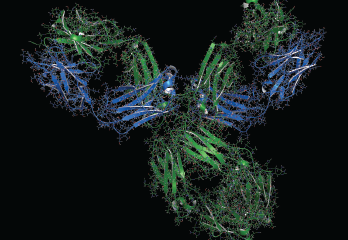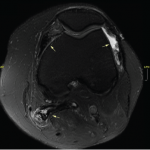
A 3-D rendering of pembrolizumab monoclonal
antibody drug protein, an immune checkpoint inhibitor targeting PD-1.
molekuul_be / shutterstock.com
CHICAGO—The body of literature on immunosuppressive drugs used to treat cancer and autoimmune diseases is growing, helping bring some clarity to their effects on the immune system and how well they work in patients. This has helped refine the questions that further research must answer, said an expert at the 2018 ACR/ARHP Annual Meeting.
The need for reliable information to guide clinicians is obvious: A “tidal wave of cancer immunotherapy” is hitting, with the approach now considered the fourth pillar of cancer treatment alongside the mainstays of surgical removal, chemotherapy and radiation, said Leonard Calabrese, DO, head of the Clinical Immunology Division at Cleveland Clinic, Ohio.
When activated, immune checkpoints, such as CTLA4 and PD-1 (the two prominent players in cancer treatment thus far), downregulate activated T cells, tamping down the immune response. Inhibiting them enhances the immune response. More than 160 checkpoint inhibitors (CPIs) are in preclinical and clinical trials, so their presence on the cancer stage will grow more pronounced, Dr. Calabrese said.
These two categories of CPIs, research suggests, impose their effects in different ways that could have important clinical meaning, he said. A recent review described the effect of CTLA-4 inhibition (as well as chimeric antigen receptor [CAR] T cells) as “immuno-enhancement,” and that of PD-1 and PD-L1 inhibitors as “immuno-normalization.”1
The authors describe immunity as water flowing through a pipe and cancer as a plug in the pipe once it “gets the upper hand,” Dr. Calabrese said. CTLA-4 inhibition relies more on increasing the water pressure to push out the plug—that is, revving up the immune system to fight the tumor—whereas PD-1 and PD-L1 inhibition is more like simply removing the plug, or steering the immune response more directly at the tumor.
“Until recently, all immunotherapy was considered immune enhancement; in other words, pushing the immune system through,” Dr. Calabrese said. “The introduction, particularly of PD targeting, … should be reconceptualized as to actually immune-normalize … because most of the activity is going on within the tumor microenvironment.”
Researchers are busy trying to tackle the question of how closely checkpoints and autoimmunity are linked. “The real action right now is in … trying to frame important questions to answer whether there is evidence checkpoints’ dysfunction is operative in the pathogenesis of autoimmune disease, and, in particular, rheumatic autoimmune disease,” he said.
Possible Autoimmune Effects
Two autoimmune syndromes are due to an insufficiency of CTLA-4 have been identified, and evidence indicates defective checkpoint biology contributes to the pathogenesis of rheumatoid arthritis (RA). Ex-vivo studies have shown that blockade of PD-1 leads to enhancement and proliferation of memory T cells in RA.2,3
Conflicting data on the function of the PD pathway in rheumatoid arthritis (RA) exist, but a recent paper looking at synovial tissue from RA patients, those with other diseases and controls found a transcriptomic signature associated with the effects of anti-PD-1 therapy.4 “The results suggest the PD-1 pathway is quite similar between active RA and cancer patients treated on anti-PD-1 therapy,” Dr. Calabrese said.
Uncertainty remains about immune-related adverse events (irAEs) associated with checkpoint inhibition. Although they’ve been widely reported on, Dr. Calabrese said it’s not known whether these events represent “true autoimmune diseases—classical forms of autoimmune disease that are being expressed in this challenged population—or do they represent some form of autoimmune-like disease,” he said. Almost all reports of irAEs are based on clinical descriptions, with pathophysiological investigations rare.
We do know irAEs mostly occur within the first 13 weeks, although some can be delayed and not appear until after the drug is discontinued. They can occur alone or in combination, and most are self-limiting with treatment or stoppage of the CPI, although rheumatic irAEs can be ongoing.
Dr. Calabrese emphasized the importance of vigilance for hypophysitis, which has gone from a pre-irAE incidence of one in seven per 9 million to as high as 10–15 per 100 in certain at-risk CTLA-4 recipients.
Recent findings clearly show an overall survival advantage for those experiencing an irAE and those not, indicating an irAE might serve as a biomarker for the anti-tumor response.5
Data had suggested immunosuppressive drugs don’t dampen the likelihood of a response to a checkpoint inhibitor, but recent studies have cast doubt on that finding, including a look at data from two centers that found those on 10 mg or more of prednisone had a less likely chance of responding to a checkpoint inhibitor, after controlling for a variety of variables.6
Going forward, a multidisciplinary approach to treating these patients is needed, Dr. Calabrese said. “We need to work with our oncology colleagues, and we need early referrals,” he said. “We need systems to see these patients. They can’t wait four-and-a-half months for a rheumatology consult.”
Thomas R. Collins is a freelance writer living in South Florida.
References
- Sanmamed MF, Chen L. A paradigm shift in cancer immunotherapy: From enhancement to normalization. Cell. 2018 Oct 4;175(2):313–326.
- Lo B, Abdel-Motal UM. Lessons from CTLA-4 deficiency and checkpoint inhibition. Curr Opin Immunol. 2017 Dec;49:14–19.
- Moret FM, van der Wurff-Jacobs KM, Biilsma JW, et al. Synovial T cell hyporesponsiveness to myeloid dendritic cells is reversed by preventing PD-1/PD-L1 interactions. Arthritis Res Ther. 2014 Nov 30;16(6):497.
- Guo Y, Walsh AM, Canavan M, et al. Immune checkpoint inhibitor PD-1 pathway is down-regulated in synovium at various stages of rheumatoid arthritis disease progression. PLoS One. 2018 Feb 28;13(2):e0192704.
- Kostine M, Mauric E, Rouxel L, et al. Immune-related adverse events of cancer immunotherapy—when inflammatory side effects are associated with survival: A single-centre prospective cohort study. Annals of the Rheumatic Diseases. 2018;77:94–95.
- Arbour KC, Mezquita L, Long N, et al. Impact of baseline steroids on efficacy of programmed cell death-1 and programmed death-ligand 1 blockade in patients with non-small-cell lung cancer. J Clin Oncol. 2018 Oct 1;36(28):2872–2878.



